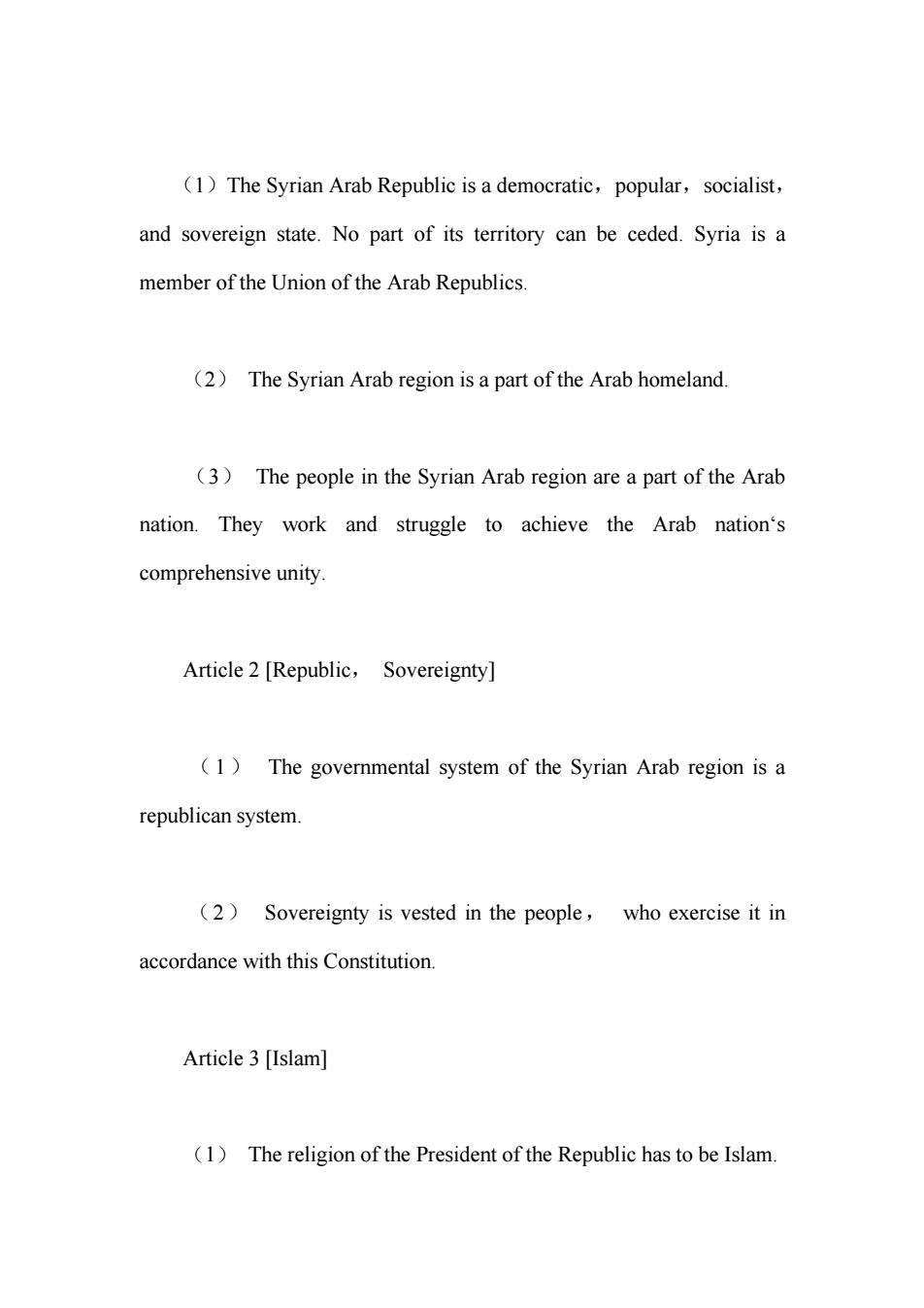
(1)The Syrian Arab Republic is a democratic,popular,socialist, and sovereign state.No part of its territory can be ceded.Syria is a member of the Union of the Arab Republics. (2)The Syrian Arab region is a part of the Arab homeland. (3)The people in the Syrian Arab region are a part of the Arab nation.They work and struggle to achieve the Arab nation's comprehensive unity. Article 2 [Republic,Sovereignty] (1)The governmental system of the Syrian Arab region is a republican system. (2)Sovereignty is vested in the people,who exercise it in accordance with this Constitution. Article 3 [Islam] (1)The religion of the President of the Republic has to be Islam
(1)The Syrian Arab Republic is a democratic,popular,socialist, and sovereign state. No part of its territory can be ceded. Syria is a member of the Union of the Arab Republics. (2) The Syrian Arab region is a part of the Arab homeland. (3) The people in the Syrian Arab region are a part of the Arab nation. They work and struggle to achieve the Arab nation‘s comprehensive unity. Article 2 [Republic, Sovereignty] (1) The governmental system of the Syrian Arab region is a republican system. (2) Sovereignty is vested in the people, who exercise it in accordance with this Constitution. Article 3 [Islam] (1) The religion of the President of the Republic has to be Islam
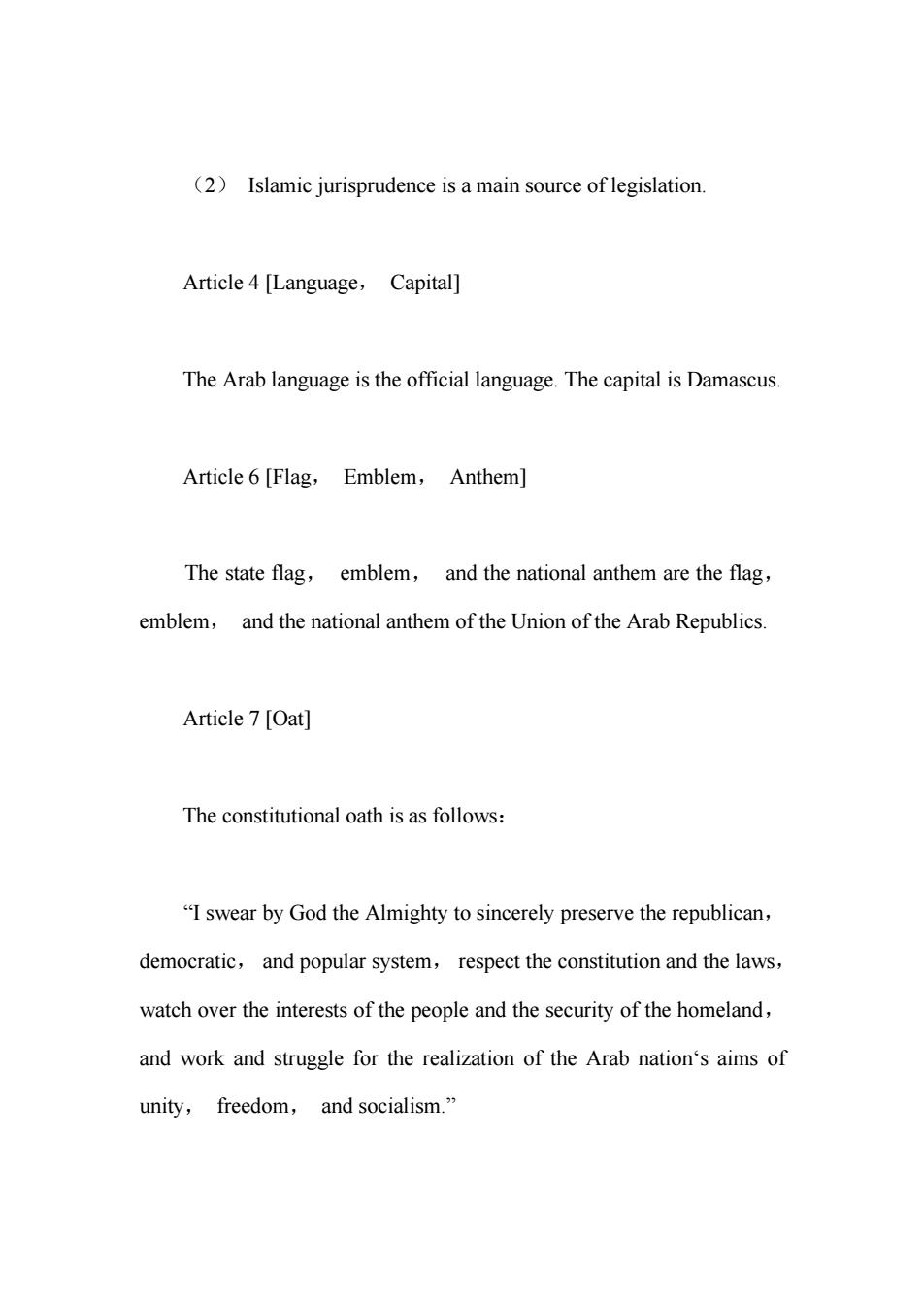
(2)Islamic jurisprudence is a main source of legislation. Article 4 [Language, Capital] The Arab language is the official language.The capital is Damascus. Article 6[Flag,Emblem,Anthem] The state flag,emblem,and the national anthem are the flag, emblem,and the national anthem of the Union of the Arab Republics. Article 7 [Oat] The constitutional oath is as follows: "I swear by God the Almighty to sincerely preserve the republican, democratic,and popular system,respect the constitution and the laws, watch over the interests of the people and the security of the homeland, and work and struggle for the realization of the Arab nation's aims of unity,freedom,and socialism
(2) Islamic jurisprudence is a main source of legislation. Article 4 [Language, Capital] The Arab language is the official language. The capital is Damascus. Article 6 [Flag, Emblem, Anthem] The state flag, emblem, and the national anthem are the flag, emblem, and the national anthem of the Union of the Arab Republics. Article 7 [Oat] The constitutional oath is as follows: “I swear by God the Almighty to sincerely preserve the republican, democratic, and popular system, respect the constitution and the laws, watch over the interests of the people and the security of the homeland, and work and struggle for the realization of the Arab nation‘s aims of unity, freedom, and socialism
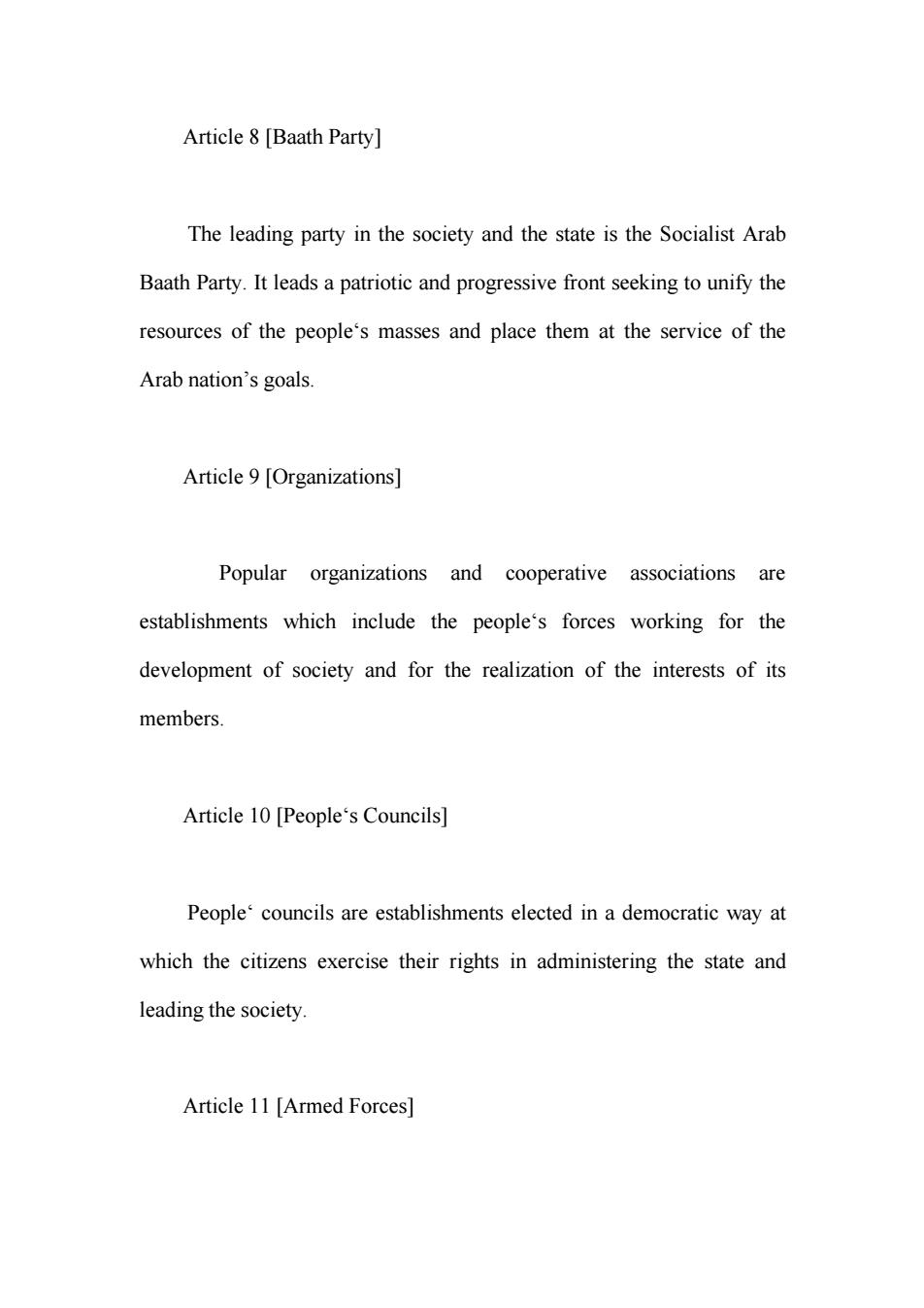
Article 8 [Baath Party] The leading party in the society and the state is the Socialist Arab Baath Party.It leads a patriotic and progressive front seeking to unify the resources of the people's masses and place them at the service of the Arab nation's goals. Article 9 [Organizations] Popular organizations and cooperative associations are establishments which include the people's forces working for the development of society and for the realization of the interests of its members. Article 10 People's Councils] People'councils are establishments elected in a democratic way at which the citizens exercise their rights in administering the state and leading the society. Article 11 [Armed Forces]
Article 8 [Baath Party] The leading party in the society and the state is the Socialist Arab Baath Party. It leads a patriotic and progressive front seeking to unify the resources of the people‘s masses and place them at the service of the Arab nation’s goals. Article 9 [Organizations] Popular organizations and cooperative associations are establishments which include the people‘s forces working for the development of society and for the realization of the interests of its members. Article 10 [People‘s Councils] People‘ councils are establishments elected in a democratic way at which the citizens exercise their rights in administering the state and leading the society. Article 11 [Armed Forces]
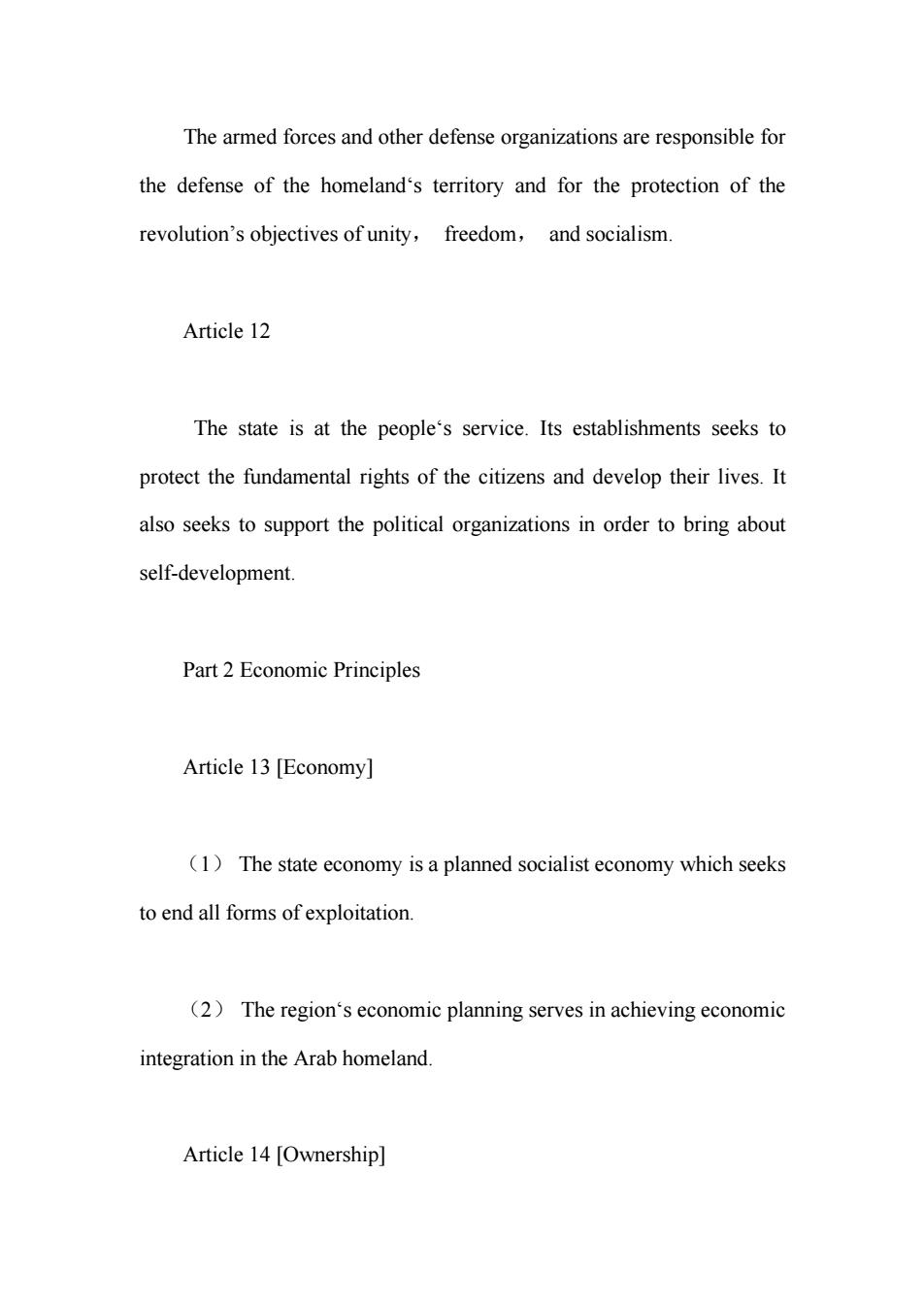
The armed forces and other defense organizations are responsible for the defense of the homeland's territory and for the protection of the revolution's objectives of unity,freedom,and socialism. Article 12 The state is at the people's service.Its establishments seeks to protect the fundamental rights of the citizens and develop their lives.It also seeks to support the political organizations in order to bring about self-development. Part 2 Economic Principles Article 13 [Economy] (1)The state economy is a planned socialist economy which seeks to end all forms of exploitation. (2)The region's economic planning serves in achieving economic integration in the Arab homeland. Article 14 [Ownership]
The armed forces and other defense organizations are responsible for the defense of the homeland‘s territory and for the protection of the revolution’s objectives of unity, freedom, and socialism. Article 12 The state is at the people‘s service. Its establishments seeks to protect the fundamental rights of the citizens and develop their lives. It also seeks to support the political organizations in order to bring about self-development. Part 2 Economic Principles Article 13 [Economy] (1) The state economy is a planned socialist economy which seeks to end all forms of exploitation. (2) The region‘s economic planning serves in achieving economic integration in the Arab homeland. Article 14 [Ownership]
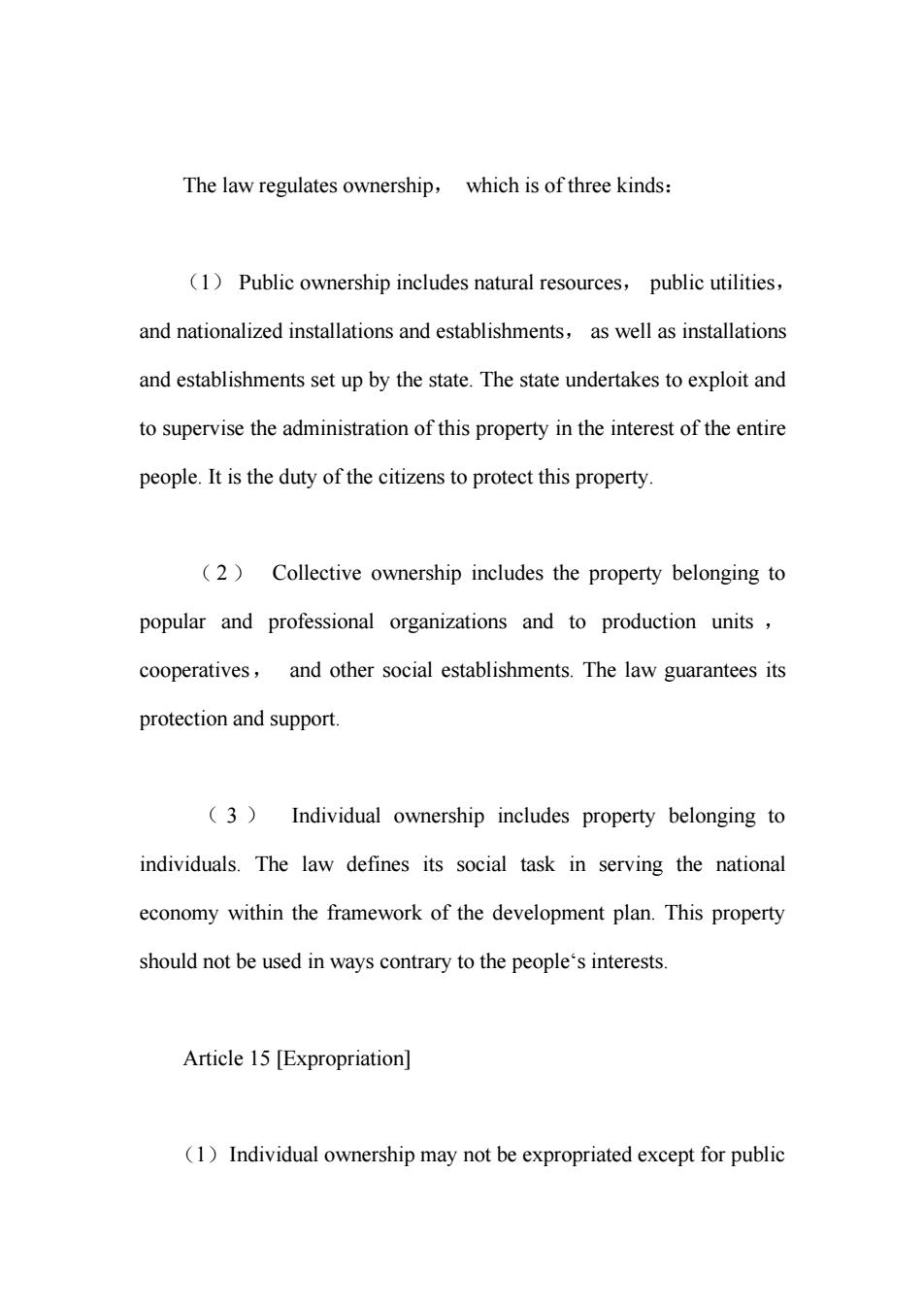
The law regulates ownership,which is of three kinds: (1)Public ownership includes natural resources,public utilities, and nationalized installations and establishments,as well as installations and establishments set up by the state.The state undertakes to exploit and to supervise the administration of this property in the interest of the entire people.It is the duty of the citizens to protect this property. (2 Collective ownership includes the property belonging to popular and professional organizations and to production units cooperatives,and other social establishments.The law guarantees its protection and support. 3 )Individual ownership includes property belonging to individuals.The law defines its social task in serving the national economy within the framework of the development plan.This property should not be used in ways contrary to the people's interests. Article 15 [Expropriation] (1)Individual ownership may not be expropriated except for public
The law regulates ownership, which is of three kinds: (1) Public ownership includes natural resources, public utilities, and nationalized installations and establishments, as well as installations and establishments set up by the state. The state undertakes to exploit and to supervise the administration of this property in the interest of the entire people. It is the duty of the citizens to protect this property. ( 2 ) Collective ownership includes the property belonging to popular and professional organizations and to production units , cooperatives, and other social establishments. The law guarantees its protection and support. ( 3 ) Individual ownership includes property belonging to individuals. The law defines its social task in serving the national economy within the framework of the development plan. This property should not be used in ways contrary to the people‘s interests. Article 15 [Expropriation] (1)Individual ownership may not be expropriated except for public